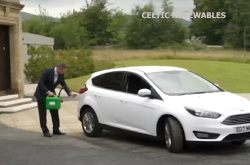위스키 부산물로 연료를

Whisky has grown popular around the world in the last 10 years. New distilleries are opening, and old distilleries are trying to produce more whisky.
But as people make more whisky, they are also making more whisky waste -- huge amounts of leftover grain and liquid.
Distillers do not have many options for what to do with this material. Some give it away to farms to feed animals. Others pay over $300,000 per year to dispose of it.
And now, a company in Edinburgh, Scotland called Celtic Renewables is trying to make fuel with it.
To understand whisky waste, you have to understand how whisky is made.
First, distillers take barley, corn or rye and turn the grain into mash. Then they combine the mixture with yeast. The yeast causes fermentation and creates alcohol.
Distillers heat the mash, create steam and then cool it down quickly. Alcohol vapor turns into liquid, ages, and eventually becomes whisky.
The used grain and water remain. In Scotland, the leftovers are called “draff” and “pot ale.”
In 2015, Celtic Renewables received money from the Scottish government for their idea to turn draff and pot ale into fuel. The money has allowed the company to create a factory able to produce 500,000 liters of biofuel each year.
The company hopes to open the factory next year.
Martin Tangney is the president of Celtic Renewables. He thinks Scotland alone has enough raw materials from the whisky industry to produce 50 million liters of biofuel right away.
Tangney recently drove a car powered by his company’s fuel around a university in Scotland.
“It's quite fitting to use a Ford for this historic drive as the original Model-T Ford ran on biofuel, and the fermentation that we've developed to put the fuel in this car is a hundred years old, proven at large scale.”
The goal is not to replace gasoline completely. It is to reduce gasoline consumption and figure out what to do with the leftover material from distilling whisky.
Tangney said his product can make up to 15 percent of commercial gasoline without drivers having to modify their engines.
"The whisky industry will now have a sustainable and reliable way of disposing of their residue,” Tangney said. "Plus we’ll create a brand new industry out of something that has no value whatsoever."

